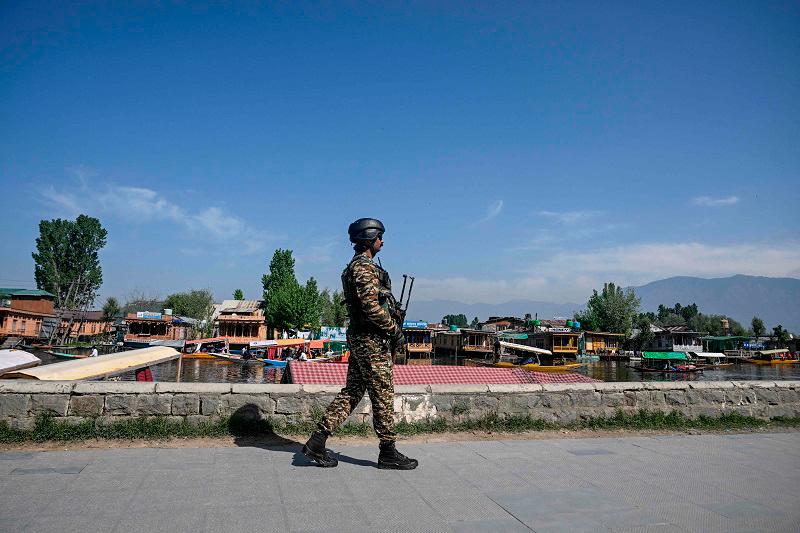NEW DELHI: Troops from Pakistan and India exchanged fire overnight across the Line of Control in disputed Kashmir, officials said Friday, after the United Nations urged the nuclear-armed rivals to show “maximum restraint” following a deadly shooting in the region.
Relations have plunged to their lowest level in years, with India accusing Pakistan of supporting “cross-border terrorism” after gunmen carried out the worst attack on civilians in contested Muslim-majority Kashmir for a quarter of a century.
Syed Ashfaq Gilani, a government official in Pakistan-administered Kashmir, told AFP Friday that troops exchanged fire along the Line of Control (LOC) that separates the two countries.
“There was no firing on the civilian population,“ he added.
India’s army confirmed there had been limited firing of small arms that it said had been “initiated by Pakistan”, adding it had been “effectively responded to”.
Indian security forces have launched a giant manhunt for those responsible for killing 26 male tourists in Pahalgam on Tuesday, with police naming two Pakistani nationals among the fugitive gunmen.
On Friday Indian troops blew up homes in Kashmir in their search and issued wanted posters with sketches of three men.
Denying involvement, Islamabad said attempts to link Pakistan to the Pahalgam attack were “frivolous”.
“Any threat to Pakistan’s sovereignty and to the security of its people will be met with firm reciprocal measures in all domains,“ a statement said, after Prime Minister Shehbaz Sharif held a rare National Security Committee with top military chiefs.
Pakistan’s Senate on Friday passed a resolution condemning a “campaign by the Indian government to malign the Pakistan government”.
Water treaty suspended
Indian Prime Minister Narendra Modi earlier had earlier said his country would “track and punish every terrorist and their backer.”
“We will pursue them to the ends of the Earth.”
UN spokesman Stephane Dujarric told reporters in New York that issues between the countries “can be and should be resolved peacefully through meaningful mutual engagement”.
Meanwhile US President Donald Trump downplayed the tensions, saying aboard Air Force One that the dispute will get “figured out, one way or another”.
Kashmir has been divided between India and Pakistan since their independence in 1947. Both claim the territory in full but govern separate portions of it.
Rebel groups have waged an insurgency in Indian-controlled Kashmir since 1989, demanding independence or a merger with Pakistan.
India’s air force and navy carried out military exercises Thursday.
Indian police say the three gunmen are members of the Pakistan-based Lashkar-e-Taiba group, a UN-designated terrorist organisation.
They offered a two million rupee ($23,500) bounty for information leading to each man’s arrest.
‘Reduce it to dust’
A day after the attack, New Delhi suspended a water-sharing treaty, announced the closure of the main land border crossing with Pakistan, downgraded diplomatic ties, and withdrew visas for Pakistanis.
Islamabad in response ordered the expulsion of Indian diplomats and military advisers, cancelling visas for Indian nationals -- with the exception of Sikh pilgrims -- and closing the main border crossing from its side.
Pakistan also warned that any attempt by India to stop water supply from the Indus River would be an “act of war.”
Pahalgam marks a dramatic shift in recent Kashmiri rebel attacks, which typically target Indian security forces.
The UN Security Council, in a declaration Friday, condemned the “terrorist attack” and called for those responsible to be brought to justice.
Experts say that a military response may still be in the pipeline.
In 2019, a suicide attack killed 41 Indian troops in Kashmir and triggered Indian air strikes inside Pakistan, bringing the countries to the brink of all-out war.
Tuesday’s assault happened as tourists enjoyed tranquil mountain views at the popular site at Pahalgam, when gunmen burst out of forests and raked crowds with automatic weapons.
Survivors told Indian media the gunmen targeted men and spared those who could give the Islamic declaration of faith.









